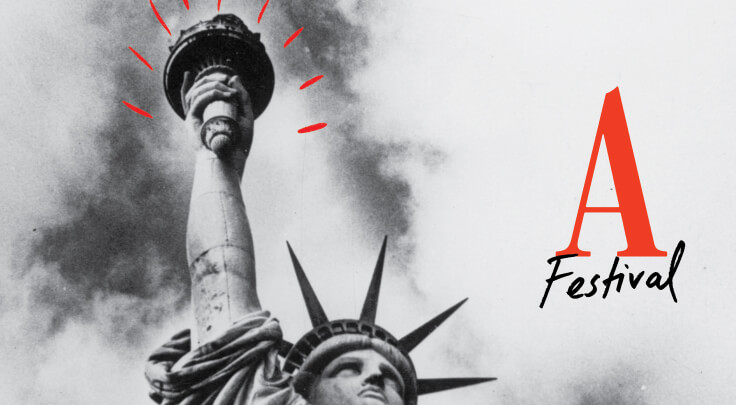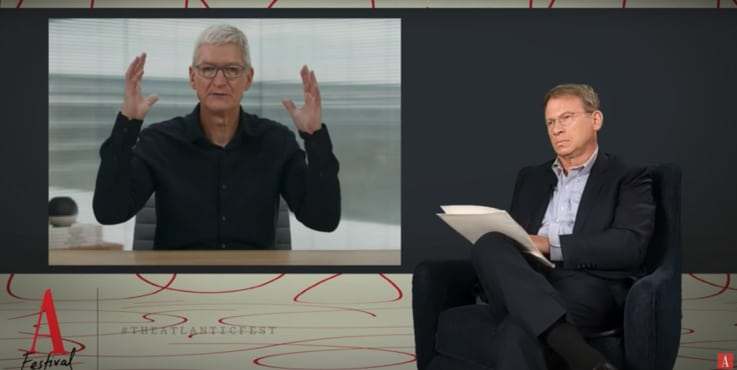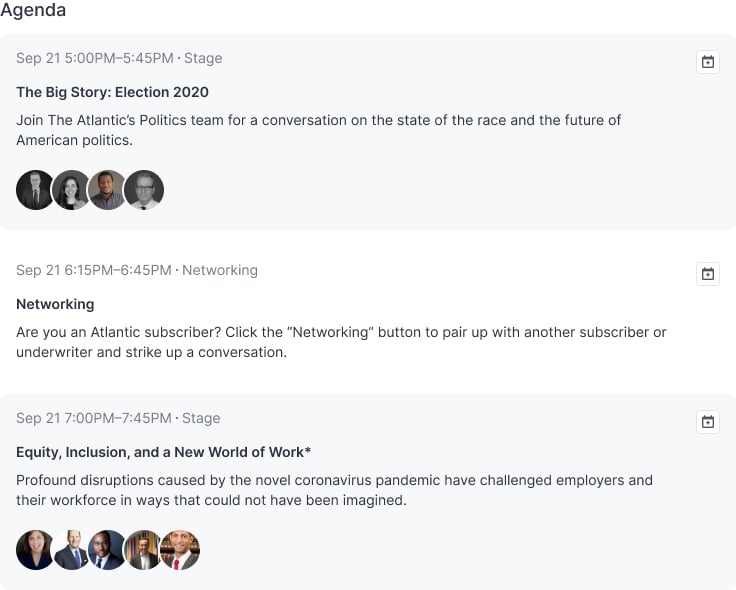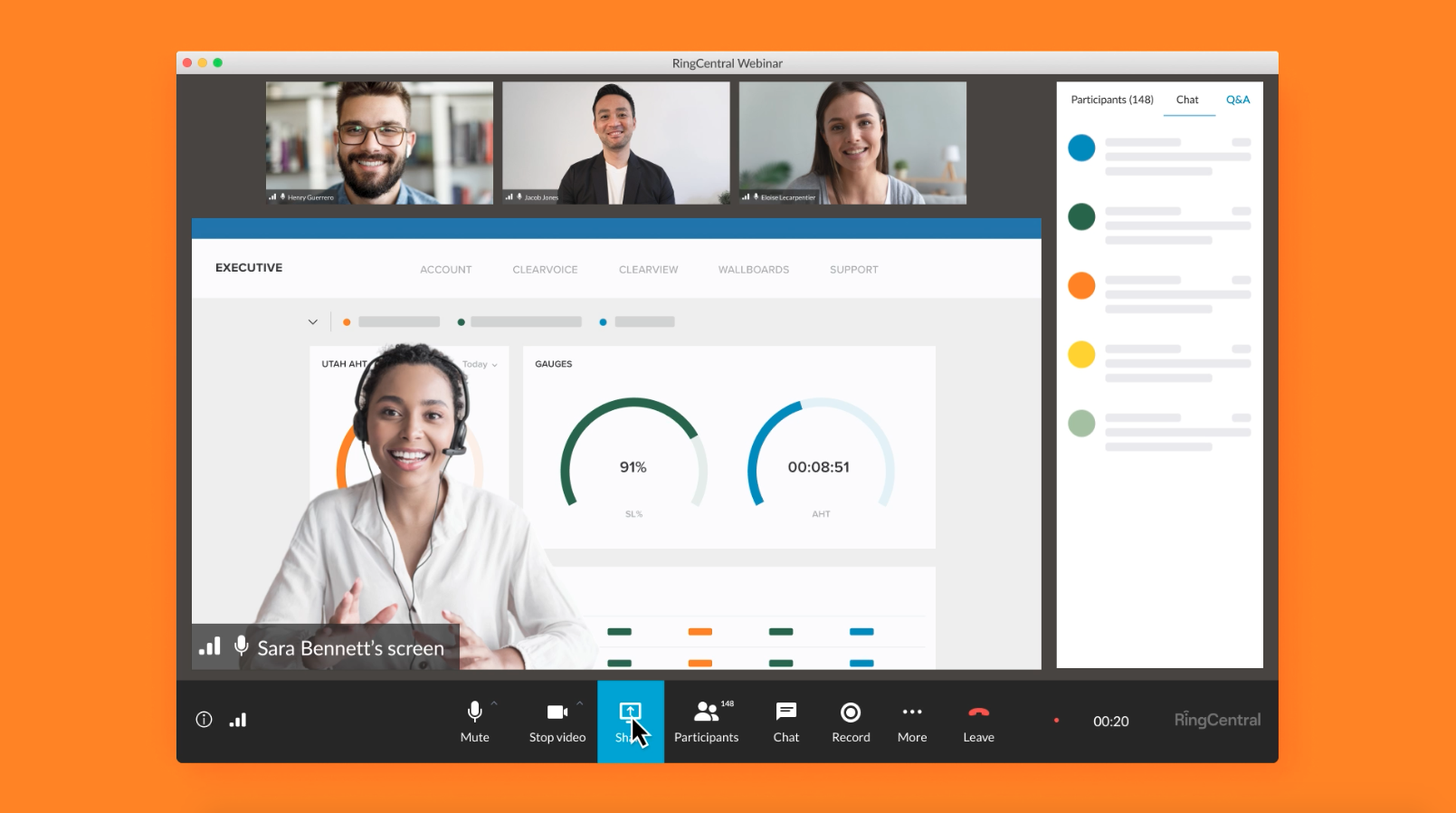
About
Back in 1857, a group of men and women founded The Atlantic magazine to share truthful, unbiased news and information with the public. Now, more than 160 years later, The Atlantic continues to cover news, politics, culture, technology, and more through both virtual media and their physical magazine.
Every year, they host The Atlantic Festival, a live event that explores the ideas and news that shape the United States of America. The event features and showcases the core of The Atlantic’s journalism from that year.
This year, The Atlantic chose to transition The 2020 Atlantic Festival from an in-person event to a virtual event.
The Atlantic Festival had three major goals for their first virtual festival
Throughout their 160+ year history, The Atlantic has always had high standards.
For their first virtual festival, they wanted to create an unparalleled virtual experience that felt like the in-person events they hosted in years past.
To accomplish this, they had three major goals for the first virtual Atlantic Festival:
- Bring the engaging, interactive audience experience at an in-person event to the virtual event. For The Atlantic, this meant giving attendees the ability to see speakers, ask them questions and meet and interact with both speakers and other guests.
- Showcase The Atlantic’s brand. Instead of feeling and looking like a typical, unbranded virtual meeting room, The Atlantic wanted to create a virtual environment where attendees could be immersed in The Atlantic experience and brand.
- Create a seamless, flawless virtual experience. The Atlantic knew that many virtual event platforms couldn’t handle The Atlantic Festival. The platform needed the capability to stream live to up to 40,000 people. So it was critically important they hosted the event on a reliable, powerful platform that could handle tens of thousands of concurrent attendees.
Why The Atlantic chose RingCentral Events to host The Atlantic Festival
In the spring of 2020, The Atlantic started searching for a virtual event platform. Their main objective was finding a platform that wouldn’t crumble under the weight of 40,000+ attendees.
After having major concerns over the reliability of one platform they tested and after interviewing numerous other virtual event platforms, they found RingCentral Events.
RingCentral Events met their 3 requirements for a virtual event platform:
- It allows event organizers to deeply customize the experience to their brand.
- It’s filled with features to engage with the virtual audience, including networking, chat, and the ability for attendees to hop on camera and ask questions.
- And it can handle 100,000+ live, concurrent attendees.
We were pleased with the branding and engagement features. And we felt really good about the reliability of the platform.
How The Atlantic Festival used three stages to structure their virtual event
The Atlantic Festival took place over four days in September.
The festival had two ticket types — a limited number of free, general admission tickets and unlimited tickets for those who subscribe to The Atlantic.
Using RingCentral Events Stage feature, The Atlantic created three unique, themed stages for the festival:
- Using RingCentral Events Stage feature, The Atlantic created three unique, themed stages for the festival:
- The festival forum stage for curated conversations, which were scattered throughout the four-day festival. This stage hosted forum-style discussions with multiple speakers to answer vital, challenging questions — like “What systemic changes are needed to create a more equitable education system?”
- The subscriber stage for exclusive events for subscribers to The Atlantic. To only permit subscribers to enter this stage, The Atlantic set RingCentral Events permissions to only allow entrance to those with a subscriber ticket, not a general admission ticket.

Between main stage events, The Atlantic scheduled a time for attendees to network using RingCentral Events Networking feature, which pairs attendees for private, one-on-one conversations with both sound and video.

The people that participated in Networking really had a nice time getting to meet people from around the country. I did Networking myself a few times and it was fun.
Wyler explains how, over the course of a few minutes, she had one-on-one conversations about weather and politics with two people from different sides of the United States.
The Atlantic Festival reimagined virtual events with unique, visionary content
The festival kicked off with Actress Anna Deavere Smith reading Martin Luther King Jr.’s Letter from a Birmingham Jail, which was originally published in The Atlantic in 1963.
They gave an intro that likened the time of The Temptations to the time of tumult that we’re experiencing now as a country.
Later on, the cast of the Broadway show Ain’t Too Proud: The Life and Times of the Temptations put on a performance from the show.
A subscriber-only session even featured The Atlantic’s crossword puzzle creator Caleb Madison. During the event, he explained what makes a good puzzle, how to build one, and the future of games at The Atlantic.

In the future, The Atlantic Festival will likely always offer a virtual option.
The first virtual Atlantic Festival was a goal-breaking, massive success.
In 2019, The Atlantic Festival drew over 3,000 guests for three days to Washington, DC.
In 2020, the virtual Atlantic Festival saw over 37,000 registrants, exceeding The Atlantic’s goal of 15,000 registrants. Additionally, Wyler explains that the team was surprised by how engaged attendees were. “The engagement was phenomenal,” she says.
Wyler attributes the massive increase in registration to shifting the event from physical to virtual and consequently, making it more accessible to people from around the globe.
Due to how successful and wide reaching the virtual festival was, The Atlantic is considering hosting a hybrid virtual and physical event for all future festivals — once COVID-19 no longer limits in-person events.
Even when we go back to doing things in person, I think we realized that this is going to continue to be a way that we want to connect with our audience. In the future, we will probably do … a hybrid event.
When asked what is the most valuable thing that RingCentral Events brings to the table, Wyler says:

Originally published Sep 01, 2022, updated Jun 10, 2024




